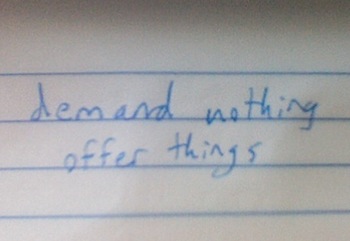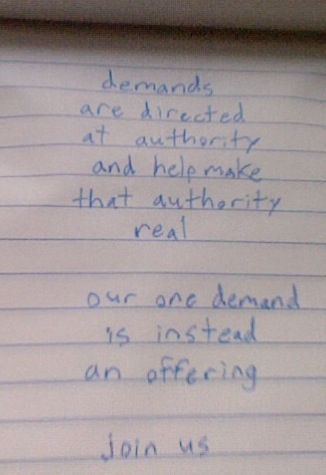Wall Street occupiers inch toward a demand—by living it

By Adam Roberts.
When, in July, Adbusters called for an occupation of Wall Street starting on September 17, it asked, “What is our one demand?” Online discussions began about what that might be, in the hopes that it could be settled ahead of time, and Adbusters even suggested a few of its own, like calling for a new anti-corruption commission (a la Anna Hazare’s controversial proposal in India) or the revocation of corporate personhood. There has also been talk about a Tobin tax, or the reinstatement of the Glass-Steagall Act, or other wonky policy proposals.
After almost two weeks of occupation in renamed Liberty Plaza, the protesters have yet to settle on any one demand, or even on the idea that they want one. (This doesn’t mean it isn’t rather obvious why a bunch of angry Americans would be making a fuss at the exact center of their country’s concentrated wealth and reckless corruption.) Still, their evening General Assembly meetings—which are devoted to big-picture items like demands—have been busy. The Assembly has so far approved two significant documents about what it stands for, documents that are indicative of what the experience of the occupation is doing to those taking part. Many who came with a particular demand in mind, even, are changing how they think about what politics, and political activism, can look like.
“This is not about the demands,” said occupier Amin Husain at a General Assembly meeting on Monday night. “The demands will come. It’s about the beautiful thing we’re doing here.” The demand, so far, appears to be a process—one in which all people can speak and money can’t.
Last Friday, September 23, in the rain, a statement called “Principles of Solidarity” was passed by consensus by the General Assembly as a working draft. (This qualification is important—again, process.) The “Principles” states in its preamble a complaint about “the blatant injustices of our times perpetuated by the economic and political elites.” The principles themselves, though, are all about method:
- Engaging in direct and transparent participatory democracy;
- Exercising personal and collective responsibility;
- Recognizing individuals’ inherent privilege and the influence it has on all interactions;
- Empowering one another against all forms of oppression;
- Redefining how labor is valued;
- The sanctity of individual privacy;
- The belief that education is human right; and
- Endeavoring to practice and support wide application of open source.
These, one might notice, have as much to do with what the occupiers are doing in their encampment as with any change they might want to make as the society as a whole. They’re practicing direct democracy in the General Assembly; they’re talking a lot about privilege and oppression; nobody is being paid for labor, but all are benefiting from it; teach-ins and a library provide for makeshift education; open-source software and methods are fueling the movement’s websites and other media. (With seemingly more cameras around the plaza than people, though, privacy is still only an ideal.) The “Principles of Solidarity” promises, at the end, that “demands will follow.”
The document that, in turn, followed it was a “Declaration of the Occupation of New York City,” passed with the usual cheers in September 29′s evening Assembly meeting:
THIS IS WHAT DEMOCRACY LOOKS LIKE!
We will vote on that now. Straw poll. Looks good!
CONSENSUS!
WOOT WOOT!
Yet this contains no demand either; instead, it’s a litany of injustices perpetrated by “corporations, which place profit over people, self-interest over justice, and oppression over equality” and which “run our government.” More than that, though, the “Declaration” is a call to action, an insistence that “it is up to the individuals to protect their own rights, and those of their neighbors.”
After the litany—which mentions such concerns as workplace discrimination, poisoning the food supply, corruption of the legal system, media manipulation, militarism, and more (footnote: “*These grievances are not all-inclusive.“)—the “Declaration” addresses the “people of the world”:
Exercise your right to peaceably assemble; occupy public space; create a process to address the problems we face, and generate solutions accessible to everyone.
To all communities that take action and form groups in the spirit of direct democracy, we offer support, documentation, and all of the resources at our disposal.
Join us and make your voices heard!

By Adam Roberts.
People do indeed seem to be joining. (WNV contributor Alyce Santoro has echoed this call with one of her own for people to “Occupy Everywhere.”) Currently, the website OccupyTogether.org lists 85 cities and towns in the United States where occupations have begun or are in the works. In many of these cases, too, it appears that horizontal, directly-democratic assemblies are being used to organize and self-govern, just like at occupied Wall Street.
The occupation is becoming more than a discrete action with a single demand, as Adbusters first conceived of it. Instead, the occupation seems to be swelling into a movement, a mode of organizing that is capable of handling many kinds of complaints, at many levels of society. After the economy collapsed in Argentina in 2001, assemblies like this formed to govern neighborhoods, factories, towns, and national movements. One of their slogans was, “Occupy, Resist, and Produce.” What started as a protest turned into a lasting way of life.
Like the refrain of the Indignados in Spain—“Real Democracy Now”—these new assemblies are enunciating a demand by carrying it out for themselves. They are being the change they wish to see in the world, as Gandhi said, working for justice with methods worthy of their goal.
During the day, crowds gather around the collage of hundreds of cardboard signs that lines the northern edge of the plaza. Each makes its own separate demand, but together they have a certain coherence: “Peaceful Revolution.” “Bail Out the People.” “Wall Street Is Our Street.” Those who stop to read them are transfixed, as if having a silent conversation with each other over the blaring of drums and the plucking of banjos. They seem, somehow, satisfied.
"A lot of people have seemed impatient that the movement now occupying Liberty Plaza near Wall Street has not stated an explicit demand. What a visit to the plaza reveals, though, is that what really matters is not a what at all, but a how." by Jaisal Noor













No comments:
Post a Comment